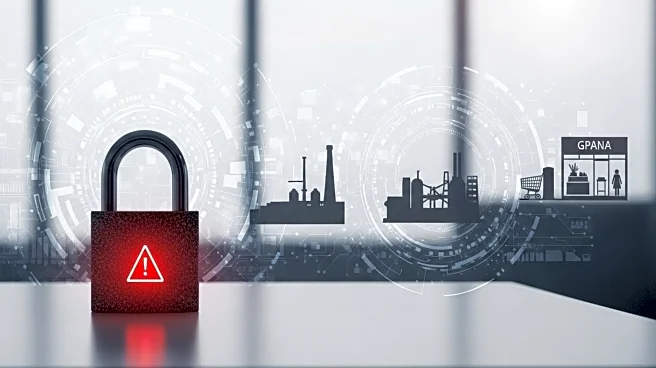What's Happening?
Jaguar Land Rover, Britain's largest automaker, has been severely affected by a cyberattack, halting production at its factories in multiple countries including England, Brazil, China, India, and Slovakia since September 1. The attack has likely cost the company millions of pounds daily, although the exact nature of the attack remains unconfirmed. Cybersecurity experts suggest it may be an extortion-based attack, where hackers demand a ransom to restore systems or data. This incident is part of a broader trend affecting major British brands, including Marks & Spencer and Co-op, which have also faced significant disruptions due to cyberattacks this year. These attacks have caused considerable inconvenience to customers, workers, suppliers, and government officials, highlighting vulnerabilities in digital operations.
Why It's Important?
The cyberattacks on major British brands underscore the growing threat of cybercrime to critical industries and the economy. For Jaguar Land Rover, the production halt not only impacts its financial performance but also affects the global supply chain, given its extensive manufacturing operations. The disruptions faced by Marks & Spencer and Co-op further illustrate the widespread impact on retail and consumer services. These incidents highlight the urgent need for robust cybersecurity measures to protect against increasingly sophisticated attacks. The economic implications are significant, as prolonged disruptions can lead to financial losses, reputational damage, and potential job losses, affecting stakeholders across the industry.
What's Next?
Jaguar Land Rover has announced plans to restart manufacturing soon, indicating that recovery efforts are underway. The company and other affected brands will likely invest in strengthening their cybersecurity infrastructure to prevent future attacks. Government officials and industry leaders may also push for enhanced regulations and collaborative efforts to improve cybersecurity resilience across sectors. As cyber threats continue to evolve, businesses will need to prioritize digital security to safeguard operations and maintain consumer trust.
Beyond the Headlines
The recent cyberattacks raise ethical and legal questions about data protection and the responsibilities of companies to safeguard customer information. There is a growing need for transparency in how companies handle cyber incidents and communicate with affected parties. Additionally, the attacks may prompt discussions on international cooperation in cybersecurity, as threats often transcend national borders. Long-term, these incidents could drive innovation in cybersecurity technologies and practices, as companies seek to stay ahead of potential threats.










